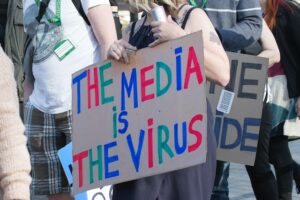Covid-19, “misinformation has killed 2,800 people”

TORONTO – Fake news, testimonials and personal narratives used to suggest a distorted interpretation of reality and social networks used as a means of spreading false information: this and much more is discussed in the report drawn up by the Council of Canadian Academies, a non-profit organization that examines complex scientific topics of public interest. Including Covid-19, as in the case of “Fault Lines” (Expert Panel on the Socioeconomic Impacts of Science and Health Misinformation), a work supported by a gigantic bibliography (over sixty pages of references) from which it clearly emerges that misinformation on the coronavirus has done great damage to Canadian society, contributing to more than 2,800 deaths and an estimated $30 million in hospital visits and intensive care. Deaths that could have been avoided and money that could have been spent elsewhere.
According to the Council of Canadian Academies, disinformation (i.e. information spread by deniers, conspiracy theorists, no-vaxes, etc.) has led people not to believe that Covid-19 was real or to believe that it was at least exaggerated, favoring the vaccine hesitancy. Hesitation which, according to the report, would have affected more than 2.35 million people between March and November 2021 (which is the period examined by the report itself), a crucial moment in the fight against the pandemic. If those people didn’t come back delayed or refuse vaccination, deaths and hospitalizations could be avoided.
According to the report, “if those who believed COVID-19 was a hoax or exaggerated had become vaccinated as soon as a vaccine was available, hospitalizations would have been lower by an estimated 28% (approximately 13,000 fewer hospitalizations) and deaths would have been lower by 35% (approximately 2,800 fewer deaths) over the same period. The costs of hospitalization (including ICU costs) resulting from COVID-19 misinformation are conservatively estimated at $300 million over the same period. This estimate provides only a partial picture of the full costs, as it excludes physician fees, lost wages, outpatient costs, costs of treating long COVID, and wider societal costs. The consequences of COVID-19 vaccine hesitancy ripple across society and disproportionately affect racialized and underserved communities, exacerbating existing inequities”.
But, the report says, there is a good news: “we have strategies and tools that can help combat the harms of misinformation, strengthen and build trust in our institutions, and boost our ability to recognize and reject the misinformation we encounter. The enormity of the misinformation problem can feel overwhelming and impossible, but we cannot afford to turn away. The future health and well-being of people in Canada, and around the world, depend on our recognizing and responding to science and health misinformation today”.
The report in its entirety can be downloaded and consulted here: Report-Fault-Lines-digital



